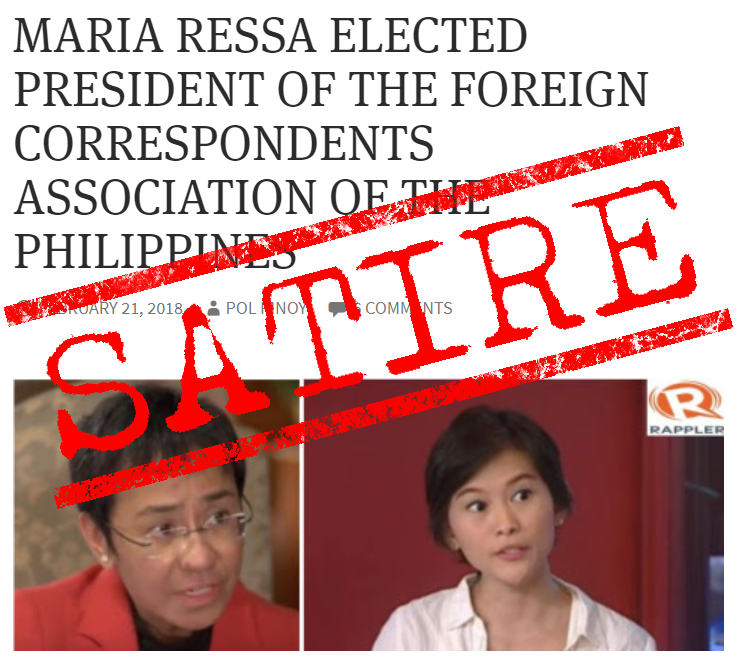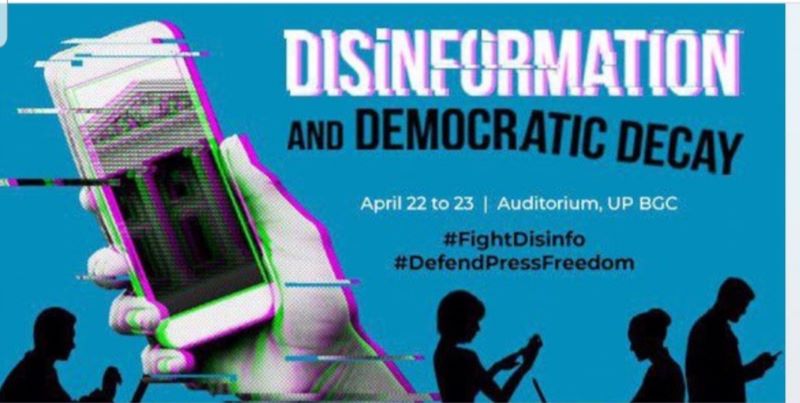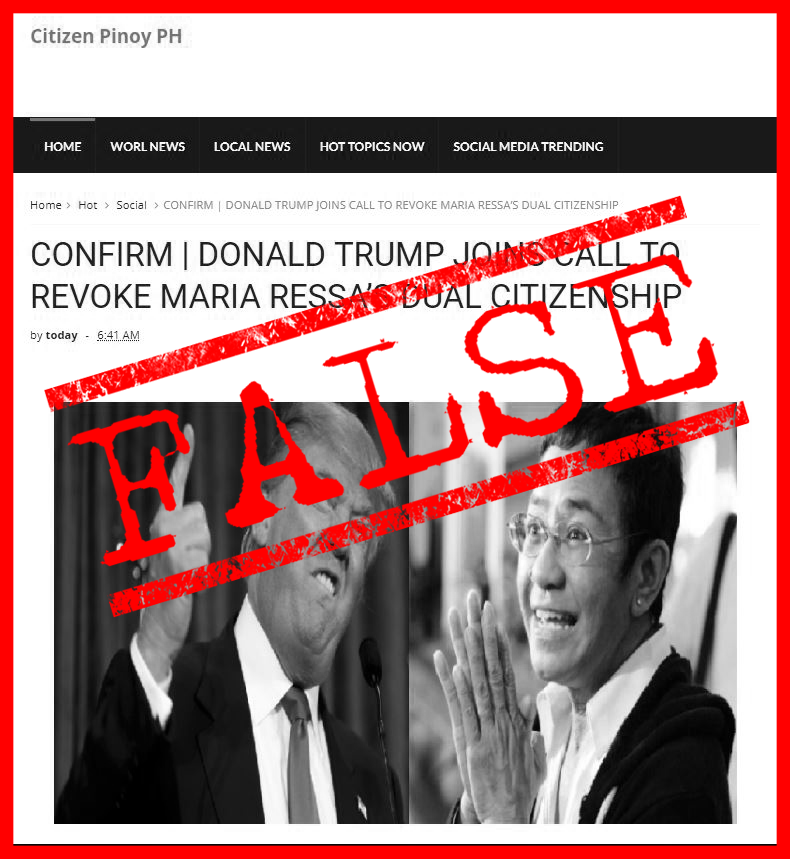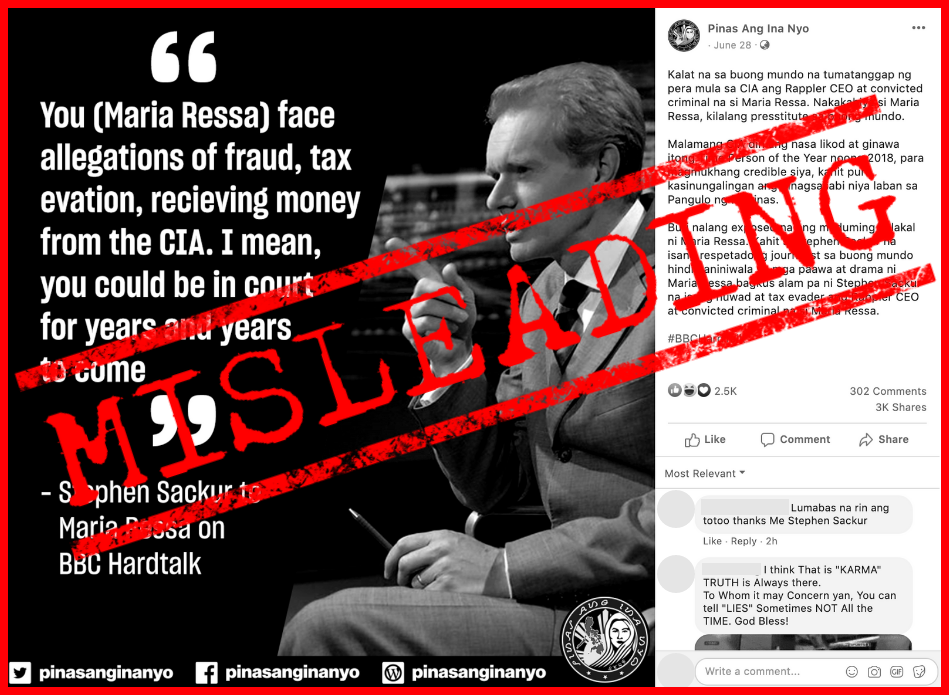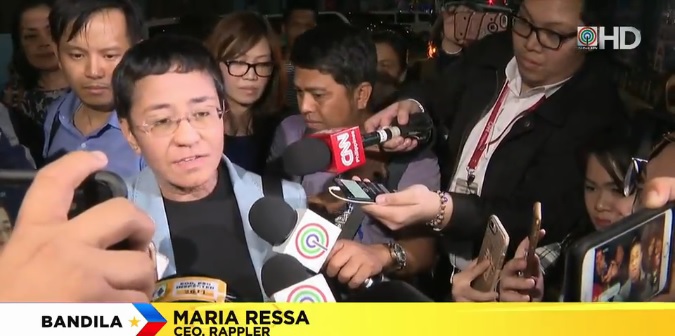
Rappler CEO Maria Ressa at the NBI headquarters. Screengraby from ABS-CBN video.
Monitoring the arrest of Rappler’s chief executive officer Maria Ressa by agents of the National Bureau of Investigation Wednesday late afternoon, I was struck by the crudeness of the operation (serving the warrant of arrest past the court’s office hours).
With all the media attention the arrest was generating, both national and international, I waited for a statement from President Duterte. There was none.
I had several questions: Does the President know what was happening? Is he on top of the operation? Where is he?
What came to mind was August 21, 1983. Former Sen.Benigno Aquino Jr. was shot upon arrival at the Manila International Airport by Rolando Galman, who was also killed.
The public later learned that then President Ferdinand Marcos was very ill and could not have been in a position to order the assassination of Aquino. Who then gave the order to kill Aquino?Thirty five years after, the Filipino people still do not know despite the fact that his widowand son were elected president and could have probed into the murder that drastically changed the country’s political course.
But that was not the situation last Monday. Although he was reported to be “not feeling well”two weeks ago, Duterte was reported to be in Laur, Nueva Ecija inaugurating a drug rehabilitation facility.
The next day, Duterte claimed he didn’t know about Ressa’s arrest. He also denied having to do with it. “Aysusmaryosep. Far from it,” he replied to reporters’ questions.
VERA Files has come up with a backgrounder on the Duterte government’s fight with Rappler. /articles/government-attacks-against-media-updated-timeline.
The Consortium on Democracy and Disinformation issued the following statement on the harassment of Maria Ressa:
The members and partners of the Consortium on Democracy and Disinformation strongly denounce the continuing harassment of Rappler editor Maria Ressa and the news organization she leads. Her arrest on February 13, 2019 is a betrayal of the guarantees of press freedom and freedom of expression enshrined in the Constitution. More, its callous execution is an indictment of a weakened justice system; its devious grounds a dangerous fabrication that affects not just journalists, but everyone.
“The fight against organized disinformation is a fight in defense of democracy. In forums across the country—Cebu, Angeles, Cagayan de Oro, Baguio, Iloilo, Metro Manila—the deleterious impact of “fake news” and other forms of disinformation on the democratic project has been confirmed again and again. Also confirmed: Organized disinformation is not an isolated problem but part of a larger assault on democracy. The President’s threats against a TV network and a newspaper, his declaration that press freedom is not a right but a privilege, his abusive language directed at journalists; the swarming by bots and trolls of critical or independent voices on social media, the denial-of-service attacks on progressive news sites, the blacklisting of reporters from coverage of the presidential palace; the sidelining or unseating of independent government officials, the continuing attempt to change the Constitution or expand martial law or lay the groundwork for a revolutionary government, the new restrictions on access to information—these, and more, are the larger context for the attacks on Rappler.
“The administration has sought to revoke Rappler’s corporate license, manufactured tax evasion charges against it, and manipulated the legal process to file a cyber-libel case against Rappler, Ressa, and a researcher. This is official harassment of a crucial news source, one that has reported deeply on the extrajudicial killings caused by an extremely violent campaign against illegal drugs, provided incontrovertible proof of organized disinformation in the digital space, and fact-checked dubious pro-administration claims on Facebook.
The Constitution guarantees the right of a news organization like Rappler to do all these and more; the arrest is only the latest instalment in a series of attacks against the guaranteed rights of a free press and of free speech. But the way the arrest was effected—at close of business hours, on only the second day of a 10-day window, and based on a warrant prompted by an inexplicably revived case—proves that the justice department intended to harass a citizen of the republic. The incomplete nature of the arrest warrant issued by a Manila court and the refusal of a Pasay night court to accept the plea to post bail show that a frail and compromised justice system failed to help that citizen, when that citizen most needed help.
Worst of all, the extreme legal theory the National Bureau of Investigation used to charge Ressa—that of “continuing publication” in a website—is fundamentally unjust and highly dangerous; it opens every person who posts online or on social media to the legal absurdity of a prescription-less crime of libel. This is useful for authoritarian regimes; it is anathema to democracies.
To all these attacks, the response is as urgent as it is obvious: Fight back, to defend democracy.
In this time of peril, the members and partners of the Consortium on Democracy & Disinformation—a network of journalists, academics, bloggers, and other independents supported by the Ateneo de Manila University, De La Salle Philippines, and the University of the Philippines—stand with Maria Ressa, Rappler, and Philippine democracy.
The network includes members from ABS-CBN, Al-Jazeera, GMA, PDI, Rappler, Vera Files; the UP College of Mass Communication, the Department of Communication at De La Salle University, the Communication department at Ateneo de Manila, and the Asian Institute of Journalism and Communication; Blogwatch, Center for Media Freedom and Responsibility, Citizen Safe, the Foundation for Media Alternatives, and Pagbabago@Pilipinas.
